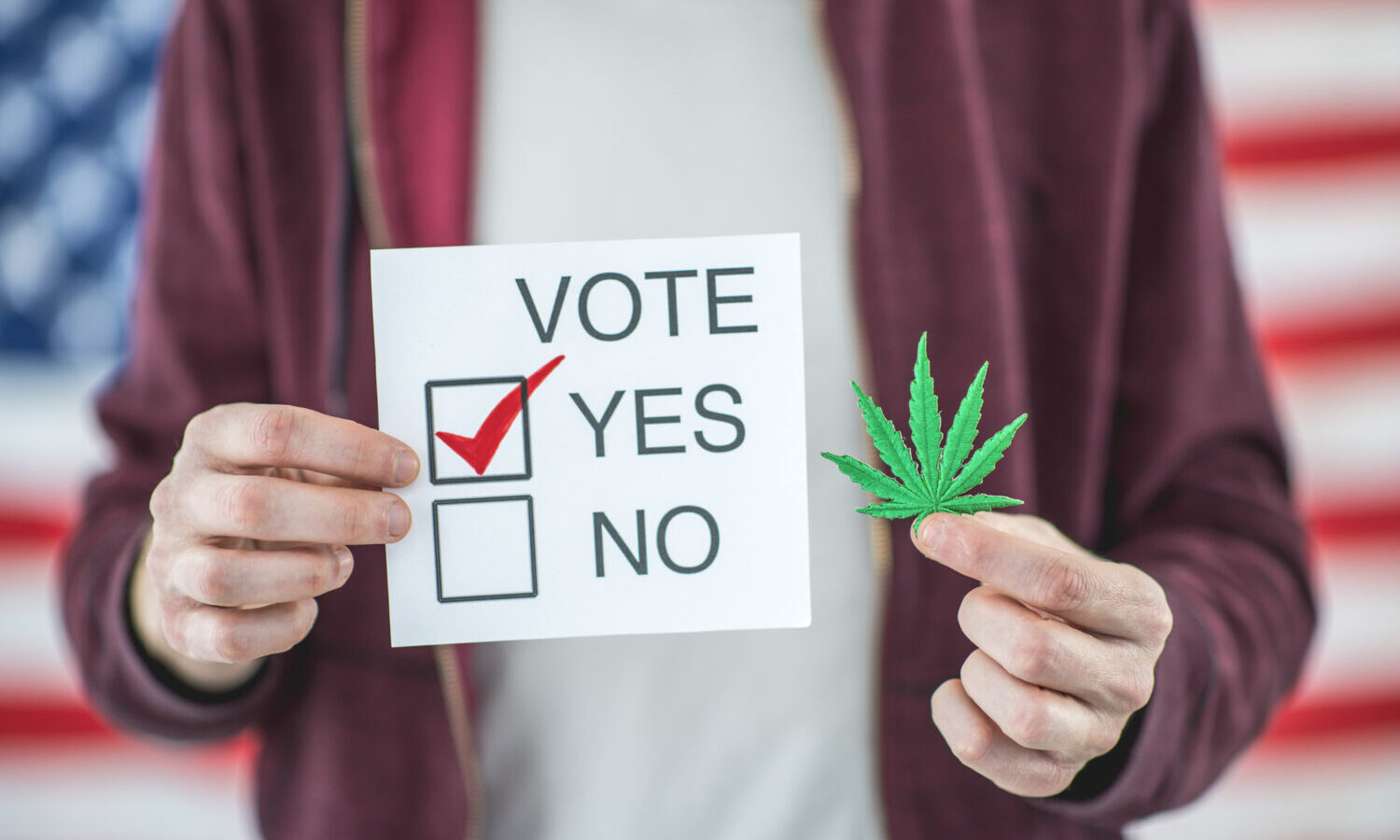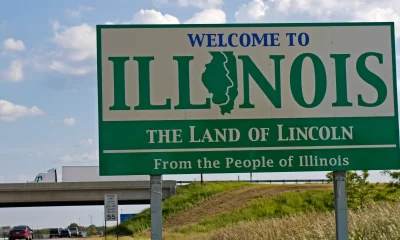Business
Cannabis Measures That Passed The Midterms That You Might Not Know About

There were several important, albeit lesser known, ballot measures that passed during the midterms that each help to end the prohibition and criminalization of marijuana in the US. Here’s what you may have missed.
The 2022 midterm elections were historical and surprising for many on several fronts. In addition to the unexpected senate and house results, there were an unusual number of historic ballot measures passed on everything from abortion rights to cannabis legalization.
By now, you have likely read that Maryland and Missouri became the twentieth and twenty first states to legalize recreational adult use cannabis. North Dakota, South Dakota and Arkansas all saw their legalization ballot measures fail. These ballot measures were the big headlines, but they were not the only ballot measures for cannabis voted on in this election. In fact, there were several important, albeit lesser known, ballot measures that passed during the midterm election that each help to end the prohibition and criminalization of marijuana in the United States.

5 Texas Cities Voted to Depenalize Marijuana Possession
In conservative Texas, where recreational marijuana is illegal and the drug itself is still highly criminalized, five cities voted to change how cannabis position is viewed in the eyes of the law. The five cities; Denton, Elgin, Harker Heights, Killeen and San Marcos all passed ballot measures that “largely prohibit local police officers from either arresting or citing people for Class A or Class B marijuana misdemeanors,” according to NORML.
This is definitely a victory for these major cities, especially in the deep red state of Texas, but these victories start creating a hyper-localized and confusing cannabis policy framework in the Longhorn state. “While these local advancements are important in mitigating harm on citizens and reprioritizing law enforcement time, they result in a patchwork of differing marijuana enforcement policies based on location,” said Texas NORML’s Executive Director Jax James, who believes this calls for lawmakers to take statewide reform measures in 2023.
5 Ohio Cities Voted to Take Local Decriminalization Measures
Texas was not the only state that had several cities vote for marijuana decriminalization measures. Citizens in five Ohio cities made similar votes. The municipalities of Corning, Kent, Laurelville, Shawnee and Rushville all approved statutes relating to marijuana decriminalization.Te
These five cities are not alone in Ohio, as 20 other cities have already taken this step, and many have done so through similar initiatives in the past. According to Benzinga, “The 20 jurisdictions across Ohio that have already approved local statutes decriminalizing cannabis possessions did so either via voter initiatives or through their city councils.” This continued forward momentum has many in Ohio optimistic about the state’s chances of legalization in the near future.
25 Towns in RI Voted to Allow New Weed Businesses Near Them
Rhode Island may have already legalized cannabis earlier this year, but it still found its way onto the ballot in 31 cities and towns this midterm election. These 31 cities were asked if they supported new cannabis-related businesses opening their doors in their towns — 25 voted yes.
This overwhelming support suggests that many in Rhode Island are ready and eager for recreational cannabis in their state, and in many individual towns. It is important to note, however, that just because the town voted “yes” does not guarantee a dispensary will be opening its doors in that town in the near future. As WPRI News explained, “Even if your municipality voted yes, it doesn’t mean a store will open there. Recreational sales are starting at existing medical marijuana dispensaries on Dec. 1, and future store locations have not yet been proposed.”

Colorado Votes to Decriminalize Psilocybin and Other Psychedelics
While this last measure does not relate directly to cannabis, it is certainly historic, and at the very least can qualify as “cannabis-adjacent.” Colorado citizens voted to decriminalize several psychedelics, including psilocybin, which is found in magic mushrooms. Proposition 122, known as the Natural Medicine Health Act of 2022 decriminalizes the possession, growing and sharing of psilocybin, psilocyn, dimethyltryptamine (DMT), ibogaine, and mescaline, according to Time.
And if that news isn’t trippy enough, “it also clears a pathway for the use of all these psychedelics at ‘healing centers’ — facilities licensed by the state’s Department of Regulatory Agencies where the public can buy, consume, and take psychedelics under supervision.”
Business
New Mexico cannabis operator fined, loses license for alleged BioTrack fraud

New Mexico regulators fined a cannabis operator nearly $300,000 and revoked its license after the company allegedly created fake reports in the state’s traceability software.
The New Mexico Cannabis Control Division (CCD) accused marijuana manufacturer and retailer Golden Roots of 11 violations, according to Albuquerque Business First.
Golden Roots operates the The Cannabis Revolution Dispensary.
The majority of the violations are related to the Albuquerque company’s improper use of BioTrack, which has been New Mexico’s track-and-trace vendor since 2015.
The CCD alleges Golden Roots reported marijuana production only two months after it had received its vertically integrated license, according to Albuquerque Business First.
Because cannabis takes longer than two months to be cultivated, the CCD was suspicious of the report.
After inspecting the company’s premises, the CCD alleged Golden Roots reported cultivation, transportation and sales in BioTrack but wasn’t able to provide officers who inspected the site evidence that the operator was cultivating cannabis.
In April, the CCD revoked Golden Roots’ license and issued a $10,000 fine, according to the news outlet.
The company requested a hearing, which the regulator scheduled for Sept. 1.
At the hearing, the CCD testified that the company’s dried-cannabis weights in BioTrack were suspicious because they didn’t seem to accurately reflect how much weight marijuana loses as it dries.
Company employees also poorly accounted for why they were making adjustments in the system of up to 24 pounds of cannabis, making comments such as “bad” or “mistake” in the software, Albuquerque Business First reported.
Golden Roots was fined $298,972.05 – the amount regulators allege the company made selling products that weren’t properly accounted for in BioTrack.
The CCD has been cracking down on cannabis operators accused of selling products procured from out-of-state or not grown legally:
- Regulators alleged in August that Albuquerque dispensary Sawmill Sweet Leaf sold out-of-state products and didn’t have a license for extraction.
- Paradise Exotics Distro lost its license in July after regulators alleged the company sold products made in California.
Golden Roots was the first alleged rulebreaker in New Mexico to be asked to pay a large fine.
Source: https://mjbizdaily.com/new-mexico-cannabis-operator-fined-loses-license-for-alleged-biotrack-fraud/
Business
Marijuana companies suing US attorney general in federal prohibition challenge

Four marijuana companies, including a multistate operator, have filed a lawsuit against U.S. Attorney General Merrick Garland in which they allege the federal MJ prohibition under the Controlled Substances Act is no longer constitutional.
According to the complaint, filed Thursday in U.S. District Court in Massachusetts, retailer Canna Provisions, Treevit delivery service CEO Gyasi Sellers, cultivator Wiseacre Farm and MSO Verano Holdings Corp. are all harmed by “the federal government’s unconstitutional ban on cultivating, manufacturing, distributing, or possessing intrastate marijuana.”
Verano is headquartered in Chicago but has operations in Massachusetts; the other three operators are based in Massachusetts.
The lawsuit seeks a ruling that the “Controlled Substances Act is unconstitutional as applied to the intrastate cultivation, manufacture, possession, and distribution of marijuana pursuant to state law.”
The companies want the case to go before the U.S. Supreme Court.
They hired prominent law firm Boies Schiller Flexner to represent them.
The New York-based firm’s principal is David Boies, whose former clients include Microsoft, former presidential candidate Al Gore and Elizabeth Holmes’ disgraced startup Theranos.
Similar challenges to the federal Controlled Substances Act (CSA) have failed.
One such challenge led to a landmark Supreme Court decision in 2005.
In Gonzalez vs. Raich, the highest court in the United States ruled in a 6-3 decision that the commerce clause of the U.S. Constitution gave Congress the power to outlaw marijuana federally, even though state laws allow the cultivation and sale of cannabis.
In the 18 years since that ruling, 23 states and the District of Columbia have legalized adult-use marijuana and the federal government has allowed a multibillion-dollar cannabis industry to thrive.
Since both Congress and the U.S. Department of Justice, currently headed by Garland, have declined to intervene in state-licensed marijuana markets, the key facts that led to the Supreme Court’s 2005 ruling “no longer apply,” Boies said in a statement Thursday.
“The Supreme Court has since made clear that the federal government lacks the authority to regulate purely intrastate commerce,” Boies said.
“Moreover, the facts on which those precedents are based are no longer true.”
Verano President Darren Weiss said in a statement the company is “prepared to bring this case all the way to the Supreme Court in order to align federal law with how Congress has acted for years.”
While the Biden administration’s push to reschedule marijuana would help solve marijuana operators’ federal tax woes, neither rescheduling nor modest Congressional reforms such as the SAFER Banking Act “solve the fundamental issue,” Weiss added.
“The application of the CSA to lawful state-run cannabis business is an unconstitutional overreach on state sovereignty that has led to decades of harm, failed businesses, lost jobs, and unsafe working conditions.”
Business
Alabama to make another attempt Dec. 1 to award medical cannabis licenses

Alabama regulators are targeting Dec. 1 to award the first batch of medical cannabis business licenses after the agency’s first two attempts were scrapped because of scoring errors and litigation.
The first licenses will be awarded to individual cultivators, delivery providers, processors, dispensaries and state testing labs, according to the Alabama Medical Cannabis Commission (AMCC).
Then, on Dec. 12, the AMCC will award licenses for vertically integrated operations, a designation set primarily for multistate operators.
Licenses are expected to be handed out 28 days after they have been awarded, so MMJ production could begin in early January, according to the Alabama Daily News.
That means MMJ products could be available for patients around early March, an AMCC spokesperson told the media outlet.
Regulators initially awarded 21 business licenses in June, only to void them after applicants alleged inconsistencies with how the applications were scored.
Then, in August, the state awarded 24 different licenses – 19 went to June recipients – only to reverse themselves again and scratch those licenses after spurned applicants filed lawsuits.
A state judge dismissed a lawsuit filed by Chicago-based MSO Verano Holdings Corp., but another lawsuit is pending.
Source: https://mjbizdaily.com/alabama-plans-to-award-medical-cannabis-licenses-dec-1/
-

 Business2 years ago
Business2 years agoPot Odor Does Not Justify Probable Cause for Vehicle Searches, Minnesota Court Affirms
-

 Business2 years ago
Business2 years agoNew Mexico cannabis operator fined, loses license for alleged BioTrack fraud
-

 Business2 years ago
Business2 years agoAlabama to make another attempt Dec. 1 to award medical cannabis licenses
-

 Business2 years ago
Business2 years agoWashington State Pays Out $9.4 Million in Refunds Relating to Drug Convictions
-

 Business2 years ago
Business2 years agoMarijuana companies suing US attorney general in federal prohibition challenge
-

 Business2 years ago
Business2 years agoLegal Marijuana Handed A Nothing Burger From NY State
-

 Business2 years ago
Business2 years agoCan Cannabis Help Seasonal Depression
-

 Blogs2 years ago
Blogs2 years agoCannabis Art Is Flourishing On Etsy













